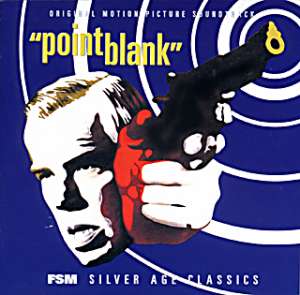Johnny MANDEL
Point Blank
Jerry FIELDING
The Outfit
OSTs
FILM SCORE MONTHLY Vol. 5 No. 8 [70:59]
Available from Film Score Monthly, 8503 Washington Boulevard, Culver City, CA90232; Tel: 1-888-345-6335; overseas: 310-253-9595; fax: 310-253-9588;
Email: Info@filmscoremonthly.com

This album brings together scores from two thrillers based on Donald E Westlake's novels about the thief Parker. Westlake wrote the (to date 21) Parker novels under the name Richard Stark, while in John Boorman's 1967 classic Point Blank Parker, played by Lee Marvin, became Walker. By whatever name this was a hard, essentially sociopathic "hero", and it proved up to Johnny Mandel's score to bring what humanity there was in the tale to the fore.
In keeping with Boorman's brilliant visual style - Marvin is shot in pin-sharp Panavision, forever surrounded by glass and mirrors, endlessly reflected his true self hidden even from himself - Mandel's work is filled with ingenious touches, a work which in 1967 was as much on the cutting edge as Goldsmith's Planet of the Apes the following year. Much of the score is hard, sharp, employing the 12-tone system, as uncompromising a soundscape of alienation as can be imagined. The last thing one might expect from a master of big band and jazz orchestra arrangements, and the composer of such scores as The Sandpiper (1966).
Then comes "Nostalgic Monologue", which opens with solo flute and paints a dreamy, jazz infused portrait with considerable skill, and we realise we are not so far removed from Mandel's home territory. At the other extreme "At the Window/The Bathroom" employs experiments with electric organ, distant percussion and voice treated with extreme amounts of reverb to produce a uniquely unsettling, spacey and kaleidoscopic underwater nightmare. By way of contrast the following cue "Joy Ride" is the kind of MOR string orchestral number one more usually associates with the composer, then "Might Good Times" dives straight into a rock workout. "This Way to Heaven" offers jazz piano trio and "I'll Slip into Something Comfortable" a glass of cocktail lounge samba. The remaining cues are generally lugubrious, with low woodwinds, high pitched flutes and almost subliminal synthesiser suggesting unresolvable neurosis. It's not pretty, and it could barely be said to be enjoyable, but it is a film music landmark.
By 1973 Robert Duvall was playing Parker, this time renamed Macklin, in The Outfit. A much more conventional film, less self-consciously "artful" than its predecessor, it nevertheless tells essentially the same story. Jerry Fielding's score is comparable too, with again atonality, spare textures, unsettling flutes as the booklet notes put it, "Stravinsky-influenced rhythms, moody and intellectual, textural writing and smooth jazz/funk interludes." The first interlude is the contemporary folk-rock-funk-jazz ballad "Quentin Blue", used over the main title. "Hotel Corridor" delivers relentless pulsating action with unstoppable cymbalon figures, the spare recorder of melody of "Eddie's Funeral" recalling the hollowness of Point Blank. Country ballad "Her Mama Passed Away" seems unfeasibly jaunty in context, but the terse, jazz influenced dark action and dark suspense soon continues with "Office Scuffle". There's little here that could be said to be enjoyable in any conventional sense, but it is an effective reminder of a lost Hollywood that once seemed so familiar, when almost all new American films seemed hard, dark, cold and on the verge of emotional collapse. It is perhaps no surprise audiences rebelled and embraced the clear cut heroics and musical grandeur of Star Wars with such enthusiasm when it finally came along. Listening to the whole album at once is a tense, stressful experience, with the scores being of more value for their place in film music and cinema history than as likeable listening experiences. As ever with Film Score Monthly the booklet notes are informative, the production values are excellent and no one can argue with the 77 minute playing time.
Gary S. Dalkin

Return to Index